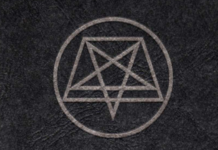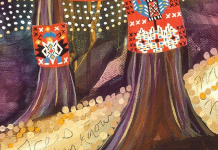This slight annoyance of being regularly asked by ‘fluffy Pagans’ if we are Satanists probably goes with the territory of being chaos magicians – at the very least we are supposed to eat a baby a week, it seems. The founder of Satanism, the late Anton LaVey, made the very pragmatic point that “stories of unbaptized babies being stolen by Satanists… were not only effective propaganda measures, but also provided a constant source of revenue for the Church, in the form of baptism fees. No Christian mother would, upon hearing of these diabolical kidnappings, refrain from getting her child properly baptized, post haste.”1 It’s all about the money, honey.
We have also had dealings with several people who would fall under the stereotypical definition of ‘real nutjobs about Satan.’ These include one especially memorable person at an academic conference on alternative religion that we attended a while back.
Picture if you will, a thin and wiry woman aged about 35, who had probably not washed her grisly and lank black hair in maybe 20 years, and who was dressed in some weird and headache-inducing psychedelic 1970s-era polyester outfit, which was all of:
- a serious fashion hazard (swirling orange, chocolate brown and purple, eek!)
- infused with years of fulminating stale body odour and
- comprised a major fire risk
When she spoke it was in a thick Dutch accent, which we have phonetically rendered here as best we can:
Ze vursst taim ai eeenvoked SayytannNN hee kaim tooo mee raight avvey… ennd….. hee hezz nevvar reeeelly lefft meee.
Translation: The first time I invoked Satan he came to me right away and he has never really left me.
Hmmmm, we rather doubt that, as he would have probably given you some fashion tips at the very least, madam…. We didn’t say that, but thought it. Several times. If that is any measure, then simply on dress sense alone, we are not Satanists…
However, while not being formally Satanic, we are always happy to be ‘the opposition’ in the terms of how as Professor Jean la Fontaine explains “the Hebrew term satanas originally meant adversary or opponent and referred not to a being but to the act or function of opposing.”2
What are we opposing?
The dogmatic, the nonsense, the blind and sheeplike servitude of a religion which relies on “the kind of God … who would damn me for not working out a deal with him… I should not care to spend eternity in the company of such a person.”3
We’re also opponents of dogmatic paganisms, for the same kind of reasons, and just for a sense of balance.
Equally, God was sometimes seen as an aid in all things, however mundane, trivial and, it seems, remarkably unfair, if so desired. As a young girl the novelist Antonia White was at a Convent school in around 1909, preparing for a hockey match against another convent. She wrote: “we are all going to do penances all day so that we may win.”4 It seems unlikely that an omnipotent God would be interested in the winner of a school sporting contest, let alone intervene, and especially so in a contest within the Christian religion. The immorality of expecting a God to do so is also something worthy of note.
And again, while not being card-carrying Satanists we do have considerable time for the philosophies of LaVey. He anticipated the ‘non-card carrying but interested’ approach of many like us (who are serial non-joiners of a multitude of groups): “I like to think of the Church of Satan as an organisation for non-joiners. Affiliation need not negate independence.”5
His Satanic Bible has remained continuously in print since it was first published in 1969,6 demonstrating a feat of appeal and longevity that very few other occult books will ever achieve. LaVey had a considerable understanding of both human motivation (for example in his criticism of the Catholic Mass, as when performed in Latin) “it is much simpler to obtain an emotional reaction using words and phrases that cannot be understood than it is with statements which even the simplest mind will question when hearing them in an understandable language”7 and the mechanisms of effective ritual work, for example: “inasmuch as ritual magic is dependent upon emotional intensity for success, all manner of emotion producing devices must be employed in its practice.”8
We have covertly employed some of LaVey’s methods (and his numinous poetry, and that of Aleister Crowley, too) in numerous Wiccan rituals that we were asked to write and then lead, without any of the numerous ‘fluffies’ present realising, or bursting into flame or turning into goats (in fact some of them told us how much they loved the imagery and the words, go figure…) so we can presume they are safe methods for use with white-lighters…
So, we’re not Satanists as such, but like anything, there is material there that is useful to add to the mix. Possibly that is a less newsworthy conclusion than the reader might hope, but most honest.
For the love of god, and for ours
– Francis Breakspear and Kate Hoolu
- Anton Szandor LaVey, The Satanic Bible, London, WH Allen, 1977 (Original 1969), p 93 [↩]
- Jean La Fontaine, Satanism and Satanic Mythology, In Bengt Ankarloo & Stuart Clark (Eds). The Athlone History of Witchcraft and Magic in Europe, Volume 6: The Twentieth Century, London, Athlone, 1999, p 83 [↩]
- McCarthy, Memories of a Catholic girlhood, p 20 in John Hodgson, The Search for the Self: Childhood in Autobiography and Fiction since 1940, Sheffield, Sheffield Academic Press, 1993, p 71 [↩]
- Antonia White, Frost in May, London, Virago, 1978 (Original 1933), p 142 [↩]
- Anton Szandor LaVey, Satan Speaks!, New York, Feral House, 1998, p 163 [↩]
- Blanche Barton, Introduction to Satan Speaks!,, p x [↩]
- Anton Szandor LaVey, The Satanic Bible, London, WH Allen, 1977 (Original 1969), p 41 [↩]
- Anton Szandor LaVey, The Satanic Rituals, New York, Avon, 1972, p 15 [↩]








